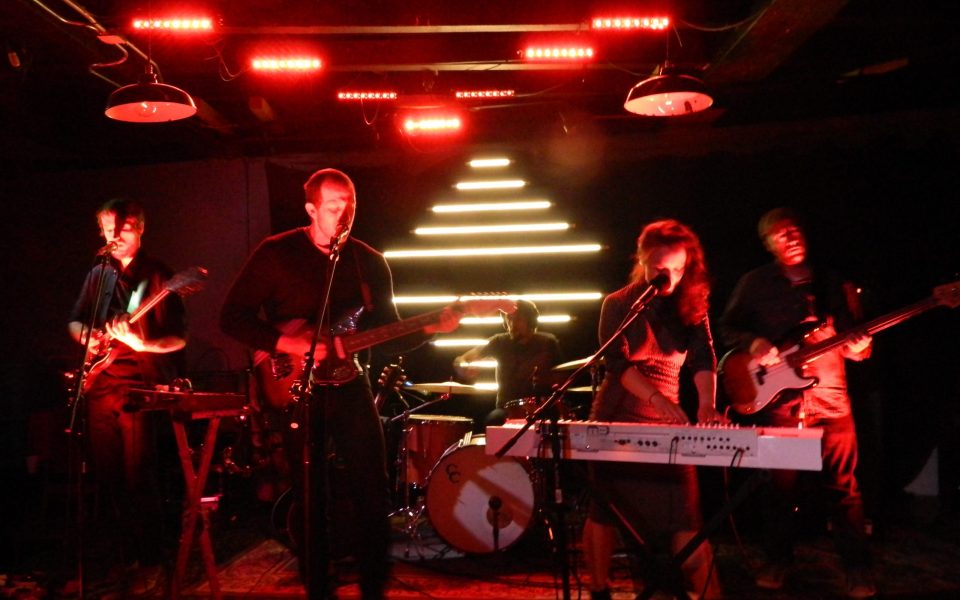by Jordan Green
Just past the midpoint of Lost in the Trees’ May 2 set at Krankies Coffee in Winston-Salem, keyboardist Emma Nadeau stopped to take stock of the moment.
“It feels like we’ve come full circle,” she said. “When we played here last at Phuzz Phest that was only the second time we’d every played these songs out and about, and now we’re at the end of our US tour.”
The Chapel Hill band enjoys an enthusiastic following in Winston-Salem thanks, in part, to their headliner status at Phuzz Phest 2013.
Coming off the heels of an album that wrestled with the loss of frontman Ari Picker’s mother, who committed suicide, and that won kudos as the Wall Street Journal’s album of the year in 2012, Lost in the Trees began workshopping the songs that would become Past Life through relentless touring last year. In a departure from the orchestral folk music that had become Lost in the Trees’ signature, the band stripped away the baroque instrumentation and reinvented itself as an electronic rock outfit, asserting the primacy of the groove. Picker’s lofty tenor, still an instrument of almost angelic ecstasy, only delivers more emotional immediacy with the new arrangement, while also conveying vulnerability and sensitivity.
Past Life arrived on Feb. 18, and when Lost in the Trees played Krankies on May 2 they did so with the confidence and ease of a band that has closed the deal with fans while achieving critical acclaim and national exposure.
Alternating between keyboards and guitar, Picker appeared relaxed and enjoying himself, along with the other four players. His tenor and Nadeau’s alto blended in gorgeous union, occasionally joined in three-part harmony by Joah Tunnell. Peter Lewis’ drumming was complex and kinetic, but in the pocket at the same time — so precise that the beats could have been produced by a machine, but all the more powerful for being created by human hands. Bass player Mark Daumen hit a monster groove right away and locked in. Instead of carrying the high end of the tonal register, the guitars added texture and sketched the contours of the songs, leaving Nadeau’s keyboard to carry the melody.
During parts of the set, as in the reggae-like “Sun,” the guitars dropped out altogether, with Nadeau’s keyboards adding only the most rudimentary ornamentation. In some songs, Picker contributed concise couplets on guitar, while Tunnell sketched a more ambitious architecture on other songs, the mesmerizing title track being a prime example..
The Human Eyes, also from Chapel Hill, opened for Lost in the Trees. Led by Kernersville native Thomas Costello, the Human Eyes shares a minimalist pop ethos with the new incarnation of Lost in the Trees. Performing songs from their album Guiding Eyes for the Blind, the band explored a sonic palette more or less anchored in the transatlantic scene that took shape roughly between 1979 and 1983. “A Sight for the Human Eyes” and “Born to Die” captured the meditative feel of early U2, while Costello’s vocals in “It’s Not the Same Without You” suggested the gawky anxiety of David Byrne. Other songs, like “My Heart Is a Graveyard” and “Another World” combined deadpan vocals and jangly guitars in a way that conjured up the Smiths.
Working towards the conclusion of their set with a pacing that seemed emotionally logical, Lost in the Trees kept its loyal audience of bearded young men and refined goth ladies enthralled. Nailing their hearts with the irresistible “Daunting Friend,” the band moved towards the finish line, where they were greeted with calls for an encore.
Picker obliged, returning alone with a hollow-body guitar to play “Walk Around the Lake,” a throwback from Lost in the Trees’ 2010 release, All Alone in an Empty House. Stripped of its original orchestration, the song provided a spare comfort belied by the bluesy phrasing of Picker’s guitar playing.
“Oh, and sometimes that’s all it takes/ Is a walk around the lake,” he sang.
It was the sound of a band that has arrived in a good place.
“This is our welcome-home show,” Picker had said after the third song in the set. “We’re landing. So thanks for being here with us, and helping us land safely.”
Join the First Amendment Society, a membership that goes directly to funding TCB‘s newsroom.
We believe that reporting can save the world.
The TCB First Amendment Society recognizes the vital role of a free, unfettered press with a bundling of local experiences designed to build community, and unique engagements with our newsroom that will help you understand, and shape, local journalism’s critical role in uplifting the people in our cities.
All revenue goes directly into the newsroom as reporters’ salaries and freelance commissions.


So good Jordan. You made me feel & have interest in something I’m not interested in.